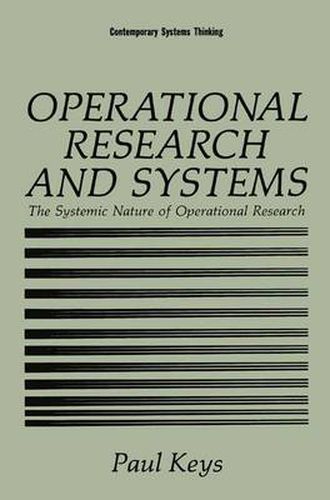Readings Newsletter
Become a Readings Member to make your shopping experience even easier.
Sign in or sign up for free!
You’re not far away from qualifying for FREE standard shipping within Australia
You’ve qualified for FREE standard shipping within Australia
The cart is loading…






This title is printed to order. This book may have been self-published. If so, we cannot guarantee the quality of the content. In the main most books will have gone through the editing process however some may not. We therefore suggest that you be aware of this before ordering this book. If in doubt check either the author or publisher’s details as we are unable to accept any returns unless they are faulty. Please contact us if you have any questions.
Contemporary Systems Thinking is a series of texts, each of which deals comparatively and/or critically with different aspects of holistic thinking at the frontiers of the discipline. Traditionally, writings by systems thinkers have been concerned with single theme propositions such as general systems theory, cybernetics, operations research, system dyna mics, soft systems methodology, and many others. Recently there have been attempts to fulfil a different, yet equally important, role by com parative analyses of viewpoints and approaches, each addressing dispa rate areas of study such as modeling and simulation, measurement, management, problem-solving methods, international relations, so cial theory, and last, but not exhaustively or least, philosophy. In a recent book these were drawn together within a multiform framework as part of an eclectic discussion-a nearly impossible task as I dis covered (see Dealing with Complexity-An Introduction to the Theory and Application of Systems Science by R. L. Flood and E. R. Carson). Neverthe less, bringing many sources together led to several achievements, among which was showing a great diversity of approaches, ideas, and application areas that systems thinking contributes to (although often with difficulties remaining unresolved). More important, however, while working on that manuscript I became aware of the need for and potential value in a series of books, each focusing in detail on the study areas mentioned above.
$9.00 standard shipping within Australia
FREE standard shipping within Australia for orders over $100.00
Express & International shipping calculated at checkout
This title is printed to order. This book may have been self-published. If so, we cannot guarantee the quality of the content. In the main most books will have gone through the editing process however some may not. We therefore suggest that you be aware of this before ordering this book. If in doubt check either the author or publisher’s details as we are unable to accept any returns unless they are faulty. Please contact us if you have any questions.
Contemporary Systems Thinking is a series of texts, each of which deals comparatively and/or critically with different aspects of holistic thinking at the frontiers of the discipline. Traditionally, writings by systems thinkers have been concerned with single theme propositions such as general systems theory, cybernetics, operations research, system dyna mics, soft systems methodology, and many others. Recently there have been attempts to fulfil a different, yet equally important, role by com parative analyses of viewpoints and approaches, each addressing dispa rate areas of study such as modeling and simulation, measurement, management, problem-solving methods, international relations, so cial theory, and last, but not exhaustively or least, philosophy. In a recent book these were drawn together within a multiform framework as part of an eclectic discussion-a nearly impossible task as I dis covered (see Dealing with Complexity-An Introduction to the Theory and Application of Systems Science by R. L. Flood and E. R. Carson). Neverthe less, bringing many sources together led to several achievements, among which was showing a great diversity of approaches, ideas, and application areas that systems thinking contributes to (although often with difficulties remaining unresolved). More important, however, while working on that manuscript I became aware of the need for and potential value in a series of books, each focusing in detail on the study areas mentioned above.